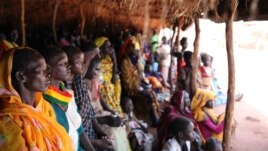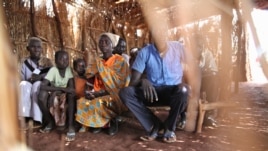August 27, 2012
YIDA, South Sudan — As conflict has raged in Sudan’s South Kordofan state and food supplies run low, a refugee camp over the border in South Sudan has swelled to more than 60,000 people. With the camp's food stocks set to run out next month, the United Nations is gearing up to deliver food, but a lack of sanitation continues to cause high levels of diarrheal diseases.
At a clinic run by medical charity Doctors Without Borders, known by its French acronym MSF, children lie quietly on beds as concerned parents try in vain to swat away the army of flies trying to settle around the sick.
Yida refugee camp in South Sudan’s Upper Nile state has doubled in size since April, as food supplies ran out across the border in the Nuba Mountains, where Sudan has waged a war against rebels since June 2011.
Hygiene issues remain key
MSF’s emergency medical coordinator in Yida, Foura Sassou, said that despite improvements in the food situation, malnutrition among children remains high due to a lack of hygiene in the camp.
“From now the main health problem is malnutrition, and it’s the consequence from diarrhea," said Sassou. "This camp has about, more than 60,000 persons, and the problem of the issue of water is very big in this camp, and hygiene in general. And this problem gives diarrhea for the child, and after they become malnourished.”
Huwa Kua Tejni said that her family fled hunger and bombs one month ago, and her husband has continued moving south to look for work.
Two of her five children, aged three and five, are now at the clinic being treated for malnutrition after suffering from diarrhea for weeks.
Since she is here alone, she said there is no one to build a toilet for the family.
“In the area we live in, there are no toilets, so we go to the toilet and when we come back we wash our hands, but not with soap," she said. "Around where we are, we have not toilet, so we just go to the bush, as [the toilets] are very far away. I’m here alone without my husband and so nobody can build a toilet for us, and this is why we are affected with so many things.”
Improvements in progress
The U.N. says that it is increasing the construction of latrine building and water points in the sprawling camp, and soon will double the soap ration to try to stem disease outbreaks and the ensuing malnutrition.
In MSF’s clinic, parents like Tejni say that two meals of grains without any paste, and sometimes without salt, means that children often get sick.
Heavy rains have now blocked trucks delivering food to Yida camp, however, so there is only enough food for another month.
Imminent food drop
Eddie Rowe, deputy director of the U.N. World Food Programme in South Sudan, said the agency will start dropping food in the coming weeks.
“In country, we have enough stocks, [but] the biggest problem is to get the food into Yida," said Rowe. "So with this caseload, 60-61,000, we expect that 3,000 metric tons of food airdropped should take the distribution up to December. In the event of a new influx, we would have to expect another round of airdrops.”
But as rains and bombs continue to pour down on Nuba Mountains, inroads in sanitation and food could be quickly undone if another wave of refugees pours over the border.
At a clinic run by medical charity Doctors Without Borders, known by its French acronym MSF, children lie quietly on beds as concerned parents try in vain to swat away the army of flies trying to settle around the sick.
Yida refugee camp in South Sudan’s Upper Nile state has doubled in size since April, as food supplies ran out across the border in the Nuba Mountains, where Sudan has waged a war against rebels since June 2011.
Hygiene issues remain key
MSF’s emergency medical coordinator in Yida, Foura Sassou, said that despite improvements in the food situation, malnutrition among children remains high due to a lack of hygiene in the camp.
“From now the main health problem is malnutrition, and it’s the consequence from diarrhea," said Sassou. "This camp has about, more than 60,000 persons, and the problem of the issue of water is very big in this camp, and hygiene in general. And this problem gives diarrhea for the child, and after they become malnourished.”
Huwa Kua Tejni said that her family fled hunger and bombs one month ago, and her husband has continued moving south to look for work.
Two of her five children, aged three and five, are now at the clinic being treated for malnutrition after suffering from diarrhea for weeks.
Since she is here alone, she said there is no one to build a toilet for the family.
“In the area we live in, there are no toilets, so we go to the toilet and when we come back we wash our hands, but not with soap," she said. "Around where we are, we have not toilet, so we just go to the bush, as [the toilets] are very far away. I’m here alone without my husband and so nobody can build a toilet for us, and this is why we are affected with so many things.”
Improvements in progress
The U.N. says that it is increasing the construction of latrine building and water points in the sprawling camp, and soon will double the soap ration to try to stem disease outbreaks and the ensuing malnutrition.
In MSF’s clinic, parents like Tejni say that two meals of grains without any paste, and sometimes without salt, means that children often get sick.
Heavy rains have now blocked trucks delivering food to Yida camp, however, so there is only enough food for another month.
Imminent food drop
Eddie Rowe, deputy director of the U.N. World Food Programme in South Sudan, said the agency will start dropping food in the coming weeks.
“In country, we have enough stocks, [but] the biggest problem is to get the food into Yida," said Rowe. "So with this caseload, 60-61,000, we expect that 3,000 metric tons of food airdropped should take the distribution up to December. In the event of a new influx, we would have to expect another round of airdrops.”
But as rains and bombs continue to pour down on Nuba Mountains, inroads in sanitation and food could be quickly undone if another wave of refugees pours over the border.













No comments:
Post a Comment